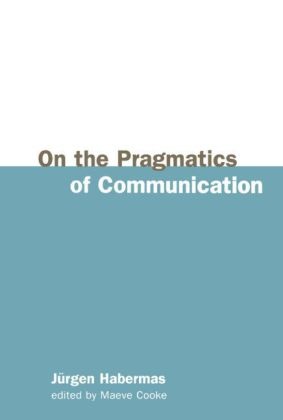Read more
This volume brings together Habermas s key writings on language and communication. Including some classic texts as well as new material which is published here for the first time, this book is a detailed and up-to-date introduction to Habermas s formal pragmatics, which is a vital aspect of his social theory.
Written from 1976 to 1996, the essays show the extent to which formal pragmatics underpins Habermas s theory of communicative action. They are presented in chronological order, so that the reader can trace developments and revisions in Habermas s thought. The volume includes a critical discussion of Searle s theory of meaning, and Richard Rorty s neopragmatism. It concludes with Habermas s recent defence of his theory of communicative action, in which he reaffirms his view that interpretative understanding inescapably involves evaluation.
This book will be an indispensable text for students and academics who want a clear and accessible introduction to the development of Habermas s theory of communication and its relation to his broader social and political theory.
List of contents
Introduction: Maeve Cooke.
1. What is Universal Pragmatics? (1976).
2. Social Action, Purposive Activity, and Communication (1981).
3. Communicative Rationality and the Theories of Meaning and Action (1986).
4. Actions, Speech Acts, Linguistically Mediated Interactions, and the Lifeworld (1988).
5. Comments on John Searle s Meaning, Communication, and Representation (1988).
6. Toward a Critique of the Theory of Meaning (1988).
7. Some Further Clarifications of the Concept of Communicative Rationality (1996).
8. Richard Rorty s Pragmatic Turn (1996).
9. On the Distinction between Poetic and Communicative Uses of Language (1985).
10. Questions and Counterquestions (1985).
Selected Bibliography and Further Reading.
Index.
About the author
Jürgen Habermas, 1929 in Düsseldorf geboren, Philosoph und Soziologe, studierte Philosophie, Geschichte und Psychologie in Göttingen, Zürich und Bonn, wo er 1954 promovierte. Von 1956 bis 1959 war er Assistent am Institut für Sozialforschung in Frankfurt am Main und nahm dort wesentliche Impulse der Frankfurter Schule auf. Aus ihrer Tradition hat er die seine weiteren Arbeiten strukturierende Fragestellung entwickelt, wie eine kritische Theorie der Gesellschaft beschaffen zu sein habe, die eine dem erreichten Stand sozialwissenschaftlicher Erkenntnis wie historischer Erfahrung angemessene Theorie der Demokratie darstelle. 1961 habilitierte er in Marburg und wurde auf ein Extraordinariat für Sozialphilosophie nach Heidelberg berufen. 1964 erhielt er eine Professur für Philosophie und Soziologie in Frankfurt am Main. 1971 wurde er, gemeinsam mit Carl-Friedrich von Weizsäcker, Direktor des "Max-Planck-Instituts zur Erforschung der Lebensbedingungen der wissenschaftlich-technischen Welt" in Starnberg. 1982 folgte Habermas dem Ruf nach Frankfurt am Main auf eine Professur für Soziologie und Philosophie. Jürgen Habermas erhielt zahlreiche Ehrendoktorwürden und Preise, darunter den "Friedenspreis des Deutschen Buchhandels" (2001), den "Kyoto-Preis" (2004) und den "Heine-Preis" (2012) "... für sein Lebenswerk, das durch freiheitliche Ideen der Aufklärung, seinen unermüdlichen Einsatz für ein demokratisch verfasstes Deutschland sowie seine streitbaren Beiträge zu den gesellschaftspolitischen Debatten Europas geprägt ist", so die Begründung der Jury. 2013 wurde Jürgen Habermas mit dem "Kulturellen Ehrenpreis" der Landeshauptstadt München ausgezeichnet. Außerdem wurde Jürgen Habermas mit dem Erasmus-Preis 2013 ausgezeichnet.
Summary
This volume brings together Habermasa s key writings on language and communication. Including some classic texts as well as new material which is published here for the first time, this book is a detailed and up--to--date introduction to Habermasa s formal pragmatics, which is a vital aspect of his social theory.
Report
Jürgen Habermas has been awarded the prestigious Friedenspreis des deutschen Buchhandels prize for 2001
"These new books by Habermas will be indispensable for years to come [and will] undoubtedly make provocative reading." Anthony Elliott, The Australian

